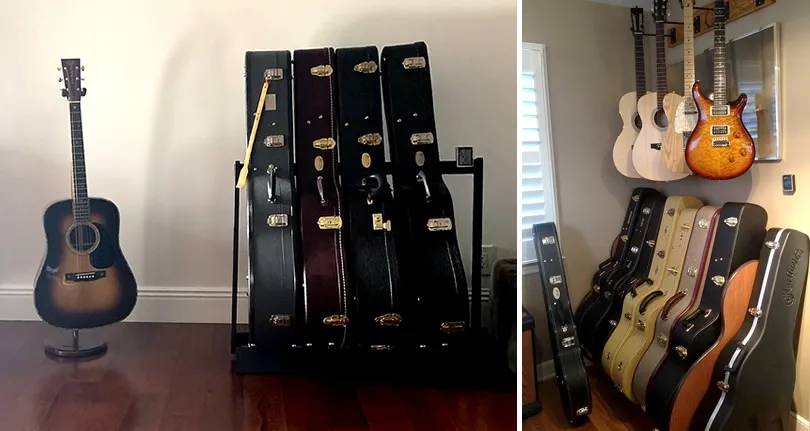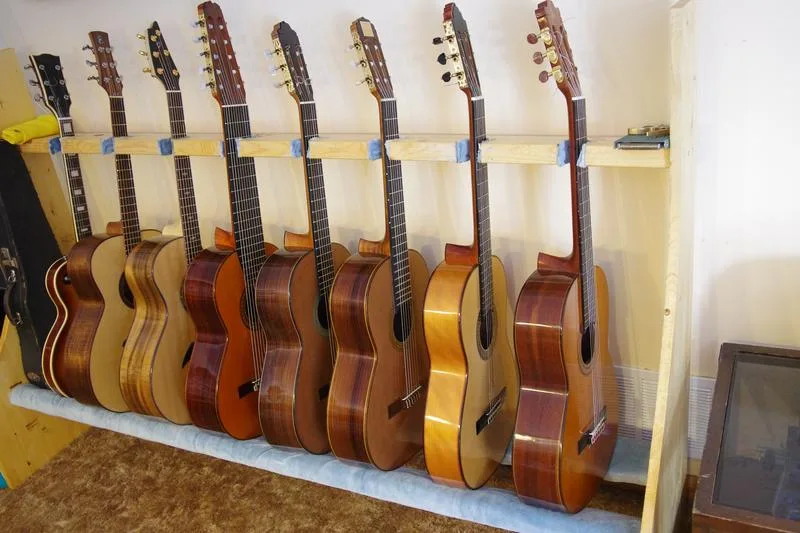Are you a guitar owner looking for tips on how to properly store your prized instrument? Then you’ve come to the right place! As an experienced guitarist, I understand the importance of taking care of your guitar and keeping it in top condition. In this article, we will go over some simple yet effective tips that will help you properly store your guitar and protect it from damage. Whether you’re storing it for a short period of time or long-term, these techniques will ensure that your guitar stays safe and ready to play whenever you are. So let’s get started on learning how to store a guitar the right way!
So, how to store a guitar?
Storing a guitar properly is crucial for maintaining its quality and ensuring it stays in good condition. Whether you’re an experienced musician or just starting out, knowing how to store your guitar correctly will save you from potential damage and costly repairs.
Firstly, it’s important to find a suitable location for your guitar. Ideally, this should be a cool and dry place with consistent temperature and humidity levels. Avoid storing your guitar in places that are prone to extreme temperatures or high levels of moisture, such as attics or basements. These conditions can cause warping, cracking, and other forms of damage to the instrument.
Next, invest in a sturdy case or gig bag to protect your guitar when not in use. This will shield it from dust, accidental bumps, and scratches. Make sure the case fits the size of your guitar snugly to prevent any movement inside which could lead to damage.
When placing your guitar inside the case or gig bag, make sure all strings are loosened slightly but not completely slackened. This helps relieve tension on the neck while also preventing any potential string breakage during storage.
It’s also important to keep your guitar away from direct sunlight as UV rays can fade its color over time. If possible, cover windows with curtains or blinds where natural light may enter the room where you store your instrument.
If you plan on storing multiple guitars together in one space, make sure they are not leaning against each other as this can cause dings and scratches on their surfaces. Use foam pads between guitars if necessary.
Lastly, regularly check on your stored guitars even if they haven’t been used for some time. Inspect them for any signs of wear or damage such as loose tuning pegs or cracks so that these issues can be addressed promptly before they worsen.
By following these simple tips for storing your beloved instrument safely,you’ll ensure that it remains playable for years to come without losing its quality and sound. Remember, proper storage is key to maintaining the value and longevity of your guitar.
Understanding the Importance of Proper Guitar Storage
Storing a guitar properly is essential for maintaining its beauty and sound quality. Guitars are delicate instruments made from wood, which can be sensitive to changes in temperature and humidity. When you leave your beloved instrument out in the open or in a damp place, it can warp or develop cracks, affecting both playability and tone. To keep your guitar safe, consider using a sturdy case or stand that offers protection against dust and accidental bumps. Temperature-controlled environments help prevent wood expansion or contraction, ensuring that the neck stays straight and the strings remain perfectly tuned.
In addition to physical protection, proper storage helps prolong the life of your strings. When not played regularly, it’s wise to loosen them slightly before securing your guitar away; this keeps tension off the neck while preventing unwanted buzzing sounds when you pick it up next time. Here are some tips for ideal storage:
- Use a hard shell case for maximum protection.
- Avoid placing it near windows where sunlight can damage finishes.
- Store in an area with stable humidity levels—around 40-60% is best.
By treating your guitar with care during storage, you’ll ensure that beautiful music continues to flow effortlessly from its strings every time you play.

Read also: is simply guitar worth it
Choosing the Right Case for Your Guitar
When it comes to protecting your guitar, picking the right case is essential. Guitars can be delicate instruments that need safeguarding against bumps and scratches during travel or storage. There are a few main types of cases to consider: hardshell, softshell, and gig bags. Hardshell cases are made of sturdy materials, offering maximum protection for your prized possession. They cradle the guitar snugly inside with plush interior linings that prevent damage from jarring movements.
On the other hand, softshell cases are lighter and more portable but still provide decent protection against dust and minor dings. For musicians who perform regularly in different venues, a gig bag might be ideal due to its lightweight nature and carrying comfort; however, they offer less cushioning than hardshell or softshell options. When deciding which case suits you best, think about how often you’ll transport your guitar and under what conditions it will be used.
- Hardshell Cases: Best for ultimate protection.
- Softshell Cases: A balance between portability and safety.
- Gig Bags: Perfect for convenience during casual outings.
Your choice should reflect both your lifestyle as a musician and the level of care you want for your instrument!
Ideal Environment Conditions for Storing a Guitar
Creating the perfect home for your guitar is essential to keeping it in top shape and ensuring its sound quality remains pristine. Temperature plays a vital role; ideally, you want to maintain a steady temperature between 70°F and 75°F (21°C to 24°C). Fluctuations can cause the wood to expand or contract, which might lead to cracks or warping over time. Humidity levels are equally important; about 45% to 55% humidity is ideal for most guitars. Too little moisture can dry out the wood, while too much can encourage mold growth and damage finishes.
To set up an excellent environment, consider using a hygrometer and thermometer—these handy tools will help you regularly check conditions. If your room tends toward dryness in winter or dampness during summer months, investing in a good quality humidifier or dehumidifier might be necessary. Also, keep your guitar in its case when not in use; this offers protection from dust and sudden temperature changes. Remember to store it away from direct sunlight as well since UV rays can fade colors and harm finishes. Maintaining these ideal conditions not only enhances the life of your instrument but also ensures that beautiful music continues flowing effortlessly from its strings!
Long-term vs. Short-term Guitar Storage: What’s the Difference in Approach?
When it comes to storing your guitar, the approach you choose can greatly affect its condition over time. For long-term storage, think of creating a cozy sanctuary for your beloved instrument. This often means keeping it in a stable environment where temperature and humidity are controlled. Ideally, you want to place your guitar in a sturdy case rather than leaving it out on a stand. A hard case provides protection against dust, accidental knocks, and sudden changes in climate. Make sure to loosen the strings slightly; this helps relieve tension on the neck and prevents warping over months or years.
On the other hand, short-term storage is more about convenience without sacrificing care. If you’re only putting your guitar away for a few days or weeks—maybe because you’re traveling—you might simply use a soft gig bag for lightweight portability while still offering some level of protection. During short breaks from playing, it’s wise to keep the instrument out of direct sunlight and away from heat sources like radiators that could distort its shape quickly. In both cases, consider cleaning your guitar beforehand to remove oils or dirt that may cause damage if left unchecked during its time off stage!
You may also like: What is APX style guitar
Proper Maintenance and Care before Storing Your Guitar.
Taking care of your guitar before putting it away for storage is essential to ensure that it stays in great shape. Start by giving your instrument a good cleaning. Use a soft, lint-free cloth to wipe down the body and neck, removing fingerprints and dust. For any stubborn grime or sweat from playing, consider using a specialized guitar cleaner designed just for this purpose. Don’t forget about the strings! Changing them regularly not only enhances sound quality but also prevents rust while the guitar is stored. Once cleaned, you can apply some lemon oil on the fretboard to keep the wood hydrated and prevent cracking.
Next comes protecting your guitar from environmental factors that could cause damage over time. Make sure it’s stored in a climate-controlled environment; extreme heat or humidity can warp wood and affect tuning stability. Consider using a sturdy case rather than leaving it out in its stand—this provides an added layer of protection against accidental bumps or falls. When placing your guitar inside its case, make sure nothing is pressing against the strings too tightly; you want to avoid unwanted tension during long periods of inactivity.
Additionally, check for any loose hardware or issues before sealing it up so that when you’re ready to play again, you’ll have everything in perfect condition!
Conclusion: Ensuring Longevity through Correct Guitar Storage Practices
Taking care of your guitar is essential if you want it to last for many years. Proper storage practices not only protect the instrument from damage but also help maintain its sound quality and playability. First, consider the environment where you store your guitar. Keep it away from extreme temperatures and humidity levels, as both can be detrimental. For example, a humid room might cause wood to swell, while an overly dry space could lead to cracking. Ideally, aim for a room temperature around 70°F (21°C) with humidity levels between 40% and 60%. Using a hygrometer can help monitor these conditions.
When it’s time to put your guitar away, always use a sturdy case designed specifically for guitars—this keeps dust at bay and protects against accidental bumps or drops. If you’re using stands or wall mounts instead of cases, ensure they are stable and secure; otherwise, your beloved instrument could take a tumble! It’s also wise to loosen the strings slightly when storing long-term since tension can warp the neck over time. Lastly, regularly check on your guitar even when it’s stored; this will allow you to spot any potential issues early on before they become serious problems.

